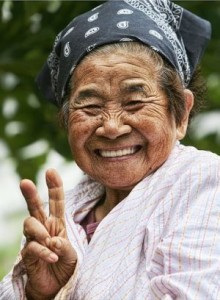Living long and prospering is not only a Vulcan custom.
Healthy eating habits and other factors are responsible for giving Okinawans astonishingly long and vigorous lives. Adopting the Okinawan way means a departure from everyday life in a Western society, but if you are eager to learn how to extend and improve our overall time on the planet, then this is a way worth adopting.
Plant-rich diets and other healthy habits can make a huge difference in both the length and quality of our lives. What we see when we grow up is disability in old age. So we’re programmed toward that – socially conditioned. But we don’t want that. For most recent generations, we want to be healthier. We want to retire earlier, take payouts and buy houses in the country. We want to spend more time with our children, our parents and our families. Is this what you want?
It’s the kind of life led by the Okinawans now, who on average, live longer than anyone else on the earth – 81.2 years versus 76.8 for Westerners. There are six times more centenarians per 100,000 people in Okinawa than anywhere else in the world, and 97% of their lives are spent free from disability, as compared to 91% for Westerners.
Okinawa is a land of happy, healthy people who communicate regularly with their dead ancestors and break into spontaneous song at the end of the workday. In many ways it’s a tropical paradise where people live very long and celebrate life. Many experts and travellers have commented that they are the happiest people they have ever seen.
While socio-economic status is linked to good health in Western countries, affluence is not what gives Okinawans their edge. They inhabit Japan’s poorest region, where the GDP is just 60% of what it is elsewhere in Japan. And it’s not because they’ve been isolated from stressful events. The once-independent kingdom has been invaded and controlled many times over the centuries. It’s not even in their genes. Studies in the 70s showed that when Japanese emigrated to Hawaii and other US states, they soon lost their health advantages and began acquiring the same diseases as their new US neighbours.
So what are their secrets?
For starters, it’s a diet rich in soy, fish and vegetables and low in fat, read meat and dairy foods. And when they sit down to a meal, they don’t gorge themselves into a stupor. Instead, they stop when they are about 80% full. And while you won’t find many Okinawans at the gym, pumping iron or running marathons, they do manage to incorporate plenty of physical activity into everyday life. That includes lots of walking, gardening, traditional dancing and martial arts like tai chi.
Beyond their healthy physical habits, Okinawans also have strong bonds with family and friends. Each home has an altar where the family goes to honour and communicate with their ancestors. The sense of connectedness extends to the broader community. One researcher told the story of an old woman who ran a ‘corner shop’. After her husband died and store’s stock became thin and stale, neighbours continued to stop by and make purchases and visit her, checking on her and making sure she had regular company.
They believe in sharing as a society. It’s called yuimaru (a connecting circle) – looking after one’s neighbour, and it’s a central theme in the Okinawan value system. Okinawans practice a unique blend of Taoism and Confucianism, with women as the acknowledged spiritual leaders. Their ‘practical spirituality’ means that the everyday and the divine are closely linked. Everything is spiritual – trees, rocks, everything – so that everything you do, you’re connecting with nature and the spirits. This may sound exotic to Westerners, but there are spiritual approaches anyone can incorporate into their own lives.
Here’s a few last tips to help you on your Okinawan way:
Eat soy burgers, tuna sandwiches and plenty of vegetables. Walk and stretch, learn tai chi and discover and interest in meditation. Have lots of plants, comfortable pillows and pictures of loved ones and friends. It’s important to cut out the world sometimes, so your home should be your sanctuary.
And if you’d like a little more technical information:
Vegetables and fruits … 10 servings a day
Whole grains … 7-13 servings a day
Calcium-rich foods … 2-4 servings a day
Flavonoid-rich foods (soy, tea, onions, apples, broccoli) … 2-4 servings a day
Omega 3-rich foods (fish, flaxseed, eggs) … 1-3 servings a day
Alcohol … drink in moderation or not at all
Cut back on red meat and animal foods
Supplement a healthy diet with vitamins and minerals
